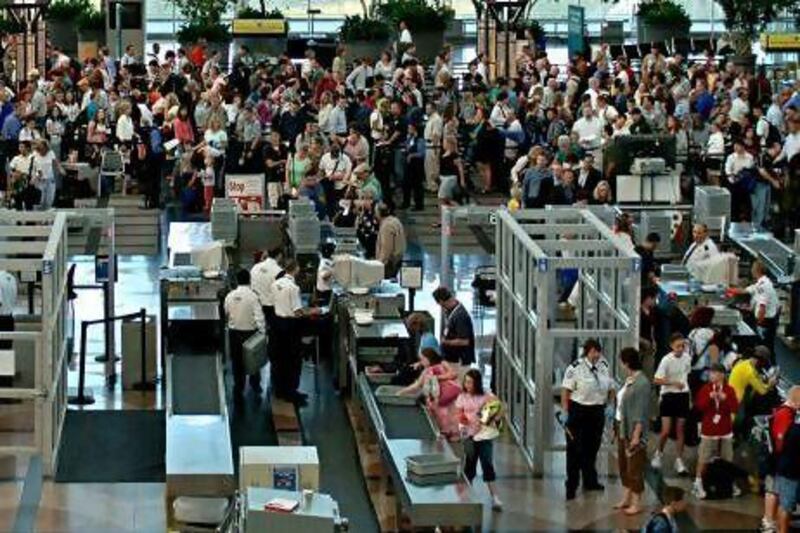If, as is feared, terrorist bombers can now manufacture explosive devices able to bypass airport security, how can they be stopped? One answer is the sort of joint intelligence operation that thwarted an attack last week planned by Al Qaeda in Yemen. James Langton reports
It is a new nightmare to add to the list of worries for anyone about get on board an aircraft; a bomb designed to be undetectable by all but the most sophisticated of airport scanners.
Despite removing their shoes, discarding any containers with more than 100ml of liquid and removing laptops from their hand luggage, travellers face the grim realisation that it may all be a waste of time.
In the United States last night, explosives experts were painstakingly picking apart what is believed to be the latest product of the Al Qaeda master bombmaker Ibrahim Hassan Al Asiri to establish whether it could have beaten airport security and brought down a passenger plane.
One anonymous source already believes that it could. He told the New York Times the device was "a new design and very difficult to detect by magnetometer", the type of detector still used in many airports.
This latest incident brings both bad and good news. The bad news is that terrorist organisations are unceasing in their attempts to bring death and destruction to the world's airlines in pursuit of their agendas.
The good news is more complicated. Both the bomber and the explosives were detected before he had so much as identified a target aircraft and bought a flight ticket, a result of good intelligence and close cooperation between different national intelligence services.
At the same time, this latest incident highlights what many security experts regard as the futility of attempting to make airports a last line of defence.
In a report in January, America's Transportation Security Administration revealed that it had spent more than $US8 billion (Dh30bn) on scanning and searching millions of airline passengers in 2011, and failed to detect a single terrorist.
Instead, the TSA has been subjected to a torrent of abuse and derision, with a stream of accounts of strip-searched pensioners, frisked toddlers and banned cupcakes.
Supporters of the TSA would argue that this intrusive level of security is precisely what had deterred such attacks in the first place. But the growing financial burden of maintaining a vast security machine and the colossal inconvenience to travellers calls into question the effectiveness of current strategies.
This debate is headline news in Britain, where interminable delays at entry points have been common in recent weeks. The situation is worst at Heathrow airport in London, where mutinous passengers, infuriated at having to queue for up to three hours to get back into their own country, have on several occasions come close to storming passport control.
Heathrow is also the gateway for this summer's Olympic Games in London, perhaps the biggest security headache the British authorities have ever faced. For the United Kingdom government, the dilemma is stark - balancing the need for effective security against the potential public relations disaster for the host nation of milling crowds in arrivals halls and planes circling overhead because their passengers cannot be accommodated in the airport below.
Heathrow's problems can be traced back to an attempt last year to reduce queues at passport control by relaxing security procedures - including biometric and fingerprint checks, and "warning index" checks of suspicious persons - at random and unpredictable hours.
It seemed like a good idea at the time. But when a newspaper revealed the extent of the relaxed security, with lurid headlines about murderous terrorists strolling into the country unchallenged, the ensuing political furore cost Brodie Clark, head of the UK Border Agency, his job and tougher rules were reintroduced.
With the Border Agency facing a 20 per cent budget cut to meet the government's austerity measures, a decision was made to balance the books by reducing the number of officers at passport control, so as not to compromise other operations, many of them undercover.
The result has been a toxic combination for the government of empty desks at passport control and vast queues of angry passengers unable to enter the country. Eventually, Theresa May, the Home Secretary, was ordered to Downing Street last weekend to come up with a solution.
For Mr Clark, the opportunity for payback was irresistible. Writing in TheTimes, he described the new tougher security measures as a "knee-jerk reaction".
By giving "committed front-line immigration staff little opportunity to use their well-developed instincts and experience", he wrote, "they become little more than box-tickers and rules followers."
Worse, he added: "The pressures of long queues reduce the effectiveness of border staff - put simply, it leads to mistakes."
In the UK, as elsewhere, it is a delicate balance of broad-brush checks and sophisticated intelligence operations that now defines the fight against worldwide terrorism.
Tellingly, the little amount of information released about this latest attempt to bomb an aircraft points to a high level of cooperation between the US Central Intelligence Agency and other governments.
It also appears to explain the decision of the US to deploy hundreds of air marshals to Europe last week to protect American-bound flights.
The FBI said yesterday that "the device never presented a threat to public safety, and the US government is working closely with international partners to address associated concerns with the device".
At the same time, the hunt continues for Al Asiri, the bombmaker for the Yemen-based Al Qaeda in the Arabian Peninsula and responsible for at least two earlier attempts to destroy US-bound aircraft.
Like this latest plot, both failed. And that, as far as it goes, is the closest thing we have to good news.







